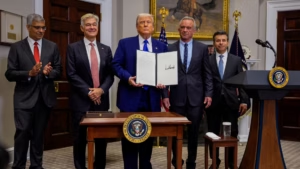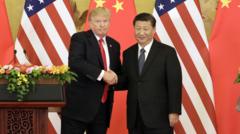Manhattan prosecutors are resisting efforts to overturn Donald Trump's criminal conviction but are open to delaying his sentencing until he leaves office in 2029, addressing issues surrounding presidential immunity and the implications for ongoing legal proceedings.
Prosecutors Suggest Delay in Trump's Sentencing Until After Presidential Term

Prosecutors Suggest Delay in Trump's Sentencing Until After Presidential Term
New York prosecutors agree to postpone sentencing for President-elect Trump, favoring a 2029 timeline.
New York prosecutors have announced their intention to oppose any attempts by President-elect Donald Trump to overturn his criminal conviction. However, they have also indicated a willingness to delay sentencing until after he completes his upcoming term in office. The Manhattan district attorney's office urged Justice Juan Merchan to explore alternatives to outright dismissal, suggesting that it might be prudent to postpone the sentencing until Trump's anticipated departure from the White House in 2029.
Currently, Trump is scheduled for sentencing on 26 November following his conviction on 34 charges of falsifying business records connected to a hush-money scandal from the 2016 presidential campaign. The prosecutors have proposed a new deadline of 9 December for both parties to submit their considerations and motions regarding the case.
The legal framework surrounding Trump's situation has become increasingly complex, especially since the US Supreme Court ruled in May that presidents may have certain protections from criminal prosecution related to their official duties. Trump's legal team is arguing that this immunity should apply to their client’s case.
Nonetheless, prosecutors emphasized that Trump's prosecution was not linked to his presidential duties, as it occurred prior to the Supreme Court's ruling. They recognized the necessity for Justice Merchan to balance competing constitutional concerns while also asking him to consider what they referred to as "non-dismissal options," which would involve putting all remaining criminal proceedings on hold.
New York attorney and former prosecutor, Mitchell Epner, noted that the prosecutors' request casts doubt on whether Trump would actually be sentenced at the scheduled hearing. He mentioned that with Trump's inauguration imminent, the court might very well postpone the proceedings until after he takes office on 20 January.
Trump’s spokesperson, Steven Cheung, has publicly declared "total and definitive victory" despite the impending legal uncertainty. Legal experts suggest that the various outcomes of Trump's multiple criminal prosecutions remain unpredictable, especially with this New York case being the only one to reach a guilty verdict so far.
The sentencing has previously been postponed multiple times, and experts speculate that such delays could continue as the implications of Trump's election victory are further evaluated.
In this highly charged political and legal atmosphere, key questions about the future of Trump's convictions and legal battles linger as the situation develops.






















